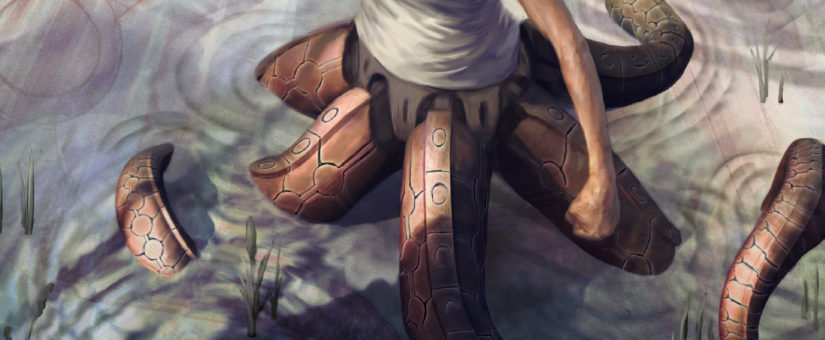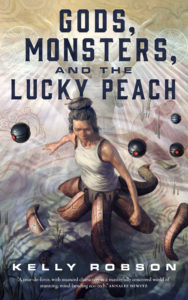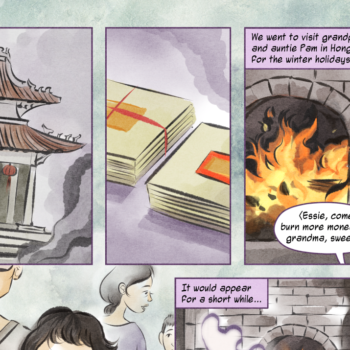
Saving the Future By Stealing From the Past: Gods, Monsters and the Lucky Peach by Kelly Robson
- Posted by Augur Blog
- On November 22, 2018
- 0 Comments
- book review, kelly robson, tor.com novella, toronto author
Reviewed by Rhonda Dynes
If you follow me on Twitter, you’ll know I just ate my first grapefruit the other day. As it happens,Toronto author Kelly Robson’s debut speculative fiction novella, Gods, Monsters, and the Lucky Peach, is just as delectable.
 It’s 2267 and Minh is an 83-year-old “post-disaster” plague baby. Minh represents a dying breed of humans born underground, but in-utero, during the ecological devastations of the twenty-second century. Minh’s legs are ruined after a devastating disease and she is given an option to make mechanical modifications to her lower body. She chooses the form of a six tentacled, bio-mechanical structure she calls “legs.”
It’s 2267 and Minh is an 83-year-old “post-disaster” plague baby. Minh represents a dying breed of humans born underground, but in-utero, during the ecological devastations of the twenty-second century. Minh’s legs are ruined after a devastating disease and she is given an option to make mechanical modifications to her lower body. She chooses the form of a six tentacled, bio-mechanical structure she calls “legs.”
After she spends most of her life dedicated to rebuilding ecological habitats essential to humanity’s survival aboveground, Minh chooses to live in the surface community (nostalgically named Calgary) she helped build. There, she can tend her endangered peach trees and fix the eco-mechanical structures already in use as she nears the end of her lifespan. Her cyber-created “fake” takes care of the day to day drudgery while she climbs tree after tree picking fruit that don’t exist elsewhere.
We learn that before the events of the novella, Minh was working on a large project to revivify a river system before the announcement was made that time travel was possible, and the world changed yet again.
“Not even Minh foresaw what actually happened: the banks lost interest in everything aboveground, and especially in long-term ecological restoration projects,” writes Robinson.
When Minh learns about a request for project proposals that combine the opportunity to time travel with the possibility of bringing back some form of the ancient Mesopotamian waterways, she can’t resist. After all, the project offers the possibility of finding an ecological and biological set of samples that might change their present world for the better.
With the help of Kiki, a post-plague “fat baby”—called so for their perfect features and genetically modified status—and Minh’s old friend Hamid, Minh is able to win the bid to go back in time. These characters rival fellow science fiction author Becky Chambers’s for their authenticity and depth. In fact, although very different in terms of genre, The Long Way to a Small Angry Planet was in my mind when I finished Lucky Peach.
But not only is Lucky Peach a work of character-driven sci-fi (with conscious avoidance of the use of “soft” sci-fi as a descriptor), it also contains elements of hard SF, biopunk/nanopunk and time travel. Calling the work just speculative fiction is concise but doesn’t reveal the depth of thought that clearly went in to this novella (not too short, not too long, just right).
The big-money story in Robson’s work is simple; it’s cheaper to go back in time and try to steal from the past than fix what is in the present. Those who may be harmed in the process don’t matter because their reality—time travelers have confirmed—has no effect on the present. But as we are made aware of straight away in Robson’s book and through small snippets positioned at the beginning of each chapter, the people of the past have their own interpretation of the strange “stars” and hovering satellites that come from the sky. And they work diligently to mount a defence against the “monsters” and “gods” who, they feel, put their survival at risk.
As Minh, Kiki, and Hamid enjoy the idyllic and, to them, almost supernaturally brilliant ecological diversity of the past, the people they have “invaded” are working against them so that they can live without their influence. When an imminent attack becomes obvious, even Minh and her team approach the problem differently and to vastly different results.
Who is the monster here? Who are the gods? Robson’s invocation at the beginning of Lucky Peach comes back, hauntingly clear: “The past is another country; we want to colonize it.”
Gods, Monsters, and Lucky Peach is filled with eco-speculative representational intersectionality; there’s just no way around the complexity and urgency of Robson’s book, and that’s a good thing. Lucky Peach’s fast-paced plot is driven by its characters’ search for the most beneficial path to grounded (literally) creative expression in a post-disaster world.
While most of the characters in Robson’s future would colonize themselves, would massacre or corrupt their own pasts in an attempt to gain reputation or power, Minh, Kiki, and Hamid provide alternatively humane perspectives on their own futures. In doing so, they urge the reader to consider or reconsider our impact on ecological diversity in the present.
While writing this review, I had the chance to have a short interview with Kelly Robson. I asked her a few questions about the novel (warning, very mild spoilers below).
Minh and Kiki’s relationship is complex. What do you think draws them to one another?
Kiki and Minh are really different people. Kiki’s 23 and just getting started in her life, while Minh is 83 and has spent a lifetime pursuing her passions. But they’re very alike, too. They’re both obsessive, and they both want to be doing things that are important. The difference is, that the world Minh was born into had a lot of opportunities for important work, but Kiki’s world is much more circumscribed. So they’re drawn to each other because of those similar obsessions.
Toronto is such a diverse city—is there a strong sci-fi/fantasy community here? Has that inspired you or prompted you to write more?
Everything that I’ve achieved in writing fiction happened after I moved to Toronto in 2013! So yeah, Toronto’s amazing speculative fiction community absolutely had a huge affect on me. It’s really wonderful here—the community gets together monthly at the ChiSeries readings which happen in Kensington Market every third Wednesday of the month. To me, community is everything. I get a lot of energy from being in a big huddle of people who are obsessed with the same things as me.
I’ve heard a sequel is coming…anything you can tell us about it?
I’m working on it right now—it’s called Time, Trouble, and the Lucky Peach. It picks up immediately after the first book ends, but the main storyline is from Kiki’s perspective. I had hoped to have it done this year, but it turns out that what all writers say is true: second books are really difficult. And I want it to be GOOD, so I won’t rush. I’d love it if the sequel could be out next year, though.
Kelly Robson. Gods, Monsters, and the Lucky Peach. Published March 2018. Tor.com, ISBN: 978-2501-6385-1, 240pp. Can $19.50.
LOVE THIS POST?
Help Augur grow by participating in our Subscription Drive! We’re looking for 75 new subscriptions by November 30. Click the banner below to see the perks & discounts we’re offering!





0 Comments